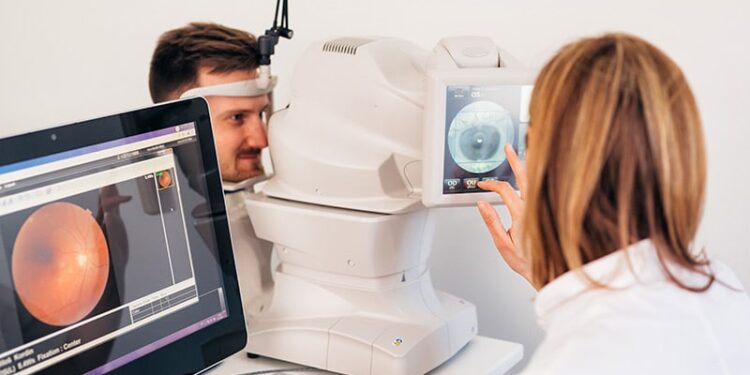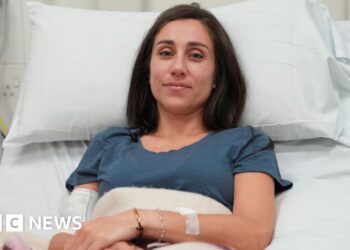Some reassuring news for patients taking GLP-1 receptor agonists: Concerns that the drugs may cause retinopathy may be overblown.
A new analysis of nearly 160,000 people with diabetes taking four different GLP-1 medications for at least a year has found no increased risk for diabetic retinopathy associated with the drugs.

“We found no difference in the risk of sight-threatening retinopathy between GLP-1 agents among adults with type 2 diabetes and moderate cardiovascular risk, and this supports choosing the most appropriate agent for patients without consideration of potential difference in diabetic retinopathy complications,” Andrew J. Barkmeier, MD, a retina specialist at Mayo Clinic in Rochester, Minnesota, reported at the American Society of Retina Specialists (ASRS) 2025 Annual Meeting in Long Beach, California.
Barkmeier presented data from a retrospective analysis of patients in a commercial and Medicare database from 2014 through 2021 who were taking semaglutide, dulaglutide, liraglutide, or exenatide.
Previous Red Flag
The 2016 SUSTAIN-6 trial, which evaluated cardiovascular outcomes in people taking semaglutide for diabetes, reported participants had a 76% greater risk for retinopathy complications. Since then, Barkmeier said, clinicians have been concerned about the potential for eye damage in patients taking GLP-1 agents, and more specifically, semaglutide. A 2023 meta-analysis found that specific GLP-1s, along with patient demographic and clinical characteristics, may also influence the risk for diabetic retinopathy.
But Barkmeier told Medscape Medical News the new study “reassures the physicians prescribing these medications and the patients taking these medications that they can choose the most appropriate GLP-1 medication for them without having to consider potential differences in diabetic retinopathy risk.”
He and his colleagues performed a three-way comparison of patients initially treated with exenatide, dulaglutide, or liraglutide, along with a two-way comparison of semaglutide and dulaglutide over the latter years of the study, “when both of those medications were prominently prescribed,” Barkmeier told attendees at the meeting. Neither comparison found any differences in the primary composite outcome, which was treatment for diabetic macular edema or proliferative retinopathy, between the drugs.
In the three-way comparison, the rate of probability of requiring retina treatment for patients was 0.4% for all three GLP-1 agents at 2 years and 0.6%-0.7% at 3 years. In the two-way comparison, the probability of treating for retinopathy outcomes for dulaglutide and semaglutide was 0.5% and 0.4% at 2 years and 0.8% and 0.7% at 3 years, respectively.
The three-way comparison was noteworthy, Barkmeier said, because the median follow-up time was around 2.5 years, and more than 12,000 patients have at least 5 years of follow-up.
“The systemic benefits of these medications are so large, and the risks of reducing cardiovascular events are so clear that any continued research related to eye complications has to be weighed in the context of all the benefits,” Barkmeier told Medscape Medical News.
‘Stay in Lane’
Geoffrey G. Emerson, MD, PhD, a retina specialist with Retina Consultants of Minnesota and president-elect of ASRS, said Barkmeier’s research answers questions about GLP-1 drugs and retinopathy raised in previous research.

“His large cohort gives us confidence that GLP-1 agents are similar in terms of their effect on diabetic retinopathy, with generally beneficial effects,” Emerson told Medscape Medical News.
Studies have found GLP-1 medications may exacerbate diabetic macular edema early in the treatment, “but usually this is short-term and manageable,” Emerson said. “We still caution that any treatment that rapidly lowers hyperglycemia can temporarily worsen diabetic macular edema.”
The study suggests that retina specialists “should stay in our lane” and take care of retinopathy in patients taking GLP-1 agents, Emerson added.
“This story is far from over,” he said. “These obesity and diabetes treatments impact the eye in various ways, including perhaps worsening macular degeneration and probably reducing the risk of retinal vein occlusion, retinal artery occlusion, and late-stage diabetic retinopathy. Overall, we think the ocular effects are mostly beneficial, but stay tuned; this is a hot topic.”
The study was independently supported. Barkmeier reported having no relevant financial relationships. Emerson reported having relationships with Roche, Eli Lilly & Company, Regeneron Pharmaceuticals, and Novartis.
Richard Mark Kirkner is a medical journalist based in Philadelphia.
Source link : https://www.medscape.com/viewarticle/study-counters-others-glp-1-diabetic-retinopathy-link-2025a1000l2j?src=rss
Author :
Publish date : 2025-08-08 08:03:00
Copyright for syndicated content belongs to the linked Source.








